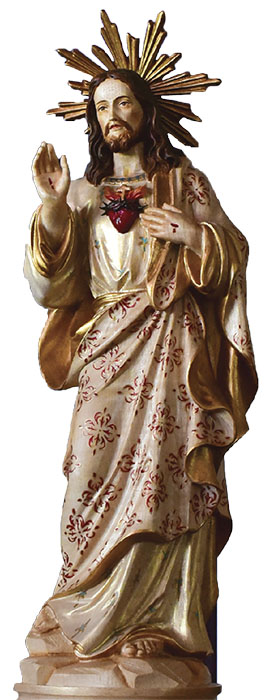The rigorous truths of religion are at variance with the spirit of the world. Should Catholics adapt to the latter’s demands, or does their mission demand something different?
In His first instructions after the Resurrection, Our Lord sent the Apostles to baptize in the name of the Father, the Son and the Holy Spirit, and commanded them to teach all nations to observe what He had prescribed for them (cf. Mt 28:19-20). However, even before the Passion, the Redeemer had warned them: “because you are not of the world, but I chose you out of the world, therefore the world hates you. […] If they persecuted Me, they will persecute you” (Jn 15:19-20).
Foreseeing the rejection that the Apostles would have to face, the Lord did not say to them: “If in any place they do not receive you or listen to you, adapt your words somewhat, so that you may be well received.” Rather, He recommended that they take a strong stance: “when you leave, shake off the dust that is on your feet for a testimony against them” (Mk 6:11).
These instructions lead us to a very current theme, discussed not only among Catholics, but also among non-Catholics.
Adapt to the world or be faithful to God?
As just noted, at no time did the Master recommend that His followers adapt themselves to the world, to the “signs of the times” – an expression so often used by those who consider themselves “modern” or “progressive”, as opposed to those qualified as “conservative” or “traditionalist”. On the contrary, He commanded them to teach all peoples a new way of living, strongly opposed to that of the men and women of those long-past and paganized times.
Now, it sometimes happens that the rigorous truths of religion are at variance with personal interests. And so the apostles of every age have been faced with a dilemma as to the direction they should take, for to conform to their times would be to reject the mission that God has entrusted to them.
In the present times, we find ourselves in the midst of “profound and rapid transformations,”1 and the less commitment these require, the more readily accepted they are. “We live under the impression of a fabulous change in the evolution of humanity,”2 wrote the then Fr. Joseph Ratzinger, future Benedict XVI, in 1970.
Faced with this panorama, many Catholics are asking themselves: is there something in the Church that must change? Ought we to adapt to everything new that comes along? Should the Church adjust itself to certain situations to avoid clashes?

The truth taught by Jesus Christ is one and absolute
Our days resemble the occasion when “He [Jesus] saw a great throng, and He had compassion on them, because they were like sheep without a shepherd” (Mk 6:34). A wide variety of ideas and doctrines are disseminated in society – and not least in the Catholic media – without any concern whether they are in fact in accord with the teachings of the Divine Redeemer. As a result, modern man feels lost, due to the lack of doctrinal clarity, and a strong desire to know the truth arises within him. Therefore, we urgently need to be unswervingly faithful to Him who is “the Way, and the Truth, and the Life” (Jn 14:6)!
In exercising her mission, the Church must teach the Truth, govern according to the Truth and sanctify according to the Truth in a world which no longer possesses the Truth, but only accepts some truths. To fulfil her mission of saving souls, she cannot adapt to the vices of society, since any adaptation to the spirit of the world easily gives rise to deviations. The truth taught by Our Lord Jesus Christ is one and absolute, and does not allow for relativism or adaptation to environments in which it is not accepted: “the faithfulness of the Lord endures for ever” (Ps 117:2).
The sun, which sustains life on earth, remains faithful to itself, without adapting to anyone. By not modifying itself and remaining always the same, it is the axis and source of life. On the other hand, one cannot imagine Christ deciding not to be “rigid” to adapt Himself, for example, to the Sanhedrin. He would cease to be Our Lord if He did so!
The Church’s future will be shaped by those who have integrity
A sad reality illustrates these comments. The German Episcopal Conference has published appalling statistics showing the number of faithful who have left the Church in that country in the last three years: more than seven hundred and ten thousand.3
Pope Benedict XVI mysteriously “prophesied” this lamentable picture when he was still a simple priest: “Our present ecclesial situation is comparable in the first place to the period of so-called modernism […]. The crisis of today is only the long-delayed resumption of the one which began then […]. Very difficult times are coming for the Church. Her real crisis has not yet begun. Serious upheavals are to be reckoned with.”4
He then stated, instilling hope, that the future of the Church will come from “those who have deep roots and live from the pure fullness of their faith,” not those who “only offer recipes,” nor those who “accommodate themselves to the present moment” or “choose the most comfortable path.”5 And he emphasized: “Today, as always, the future of the Church will be shaped anew by Saints.”6
Many facts highlight at every moment how the historical phase in which we live is the stage of an unprecedented religious crisis. In his apostolic trip to Germany, Benedict XVI did not “prophesy”, but recommended a Church free from the spirit of the world in order to fulfil her mission: “she will need […] to become in a certain sense ‘unworldly’.”7 That is, she must have more faith and less adherence to the profane.
All this requires of us Catholics an unshakable confidence in the triumph of the Holy Church – even if she seems asleep or dead – who will rise again and be exalted, presenting herself “in splendor, without spot or wrinkle or any such thing, that she might be holy and without blemish” (Eph 5:27).” ◊
Taken from the Heralds of the Gospel magazine, #169.
1 SECOND VATICAN COUNCIL. Gaudium et spes, n.4..
2 RATZINGER, Joseph. Fe y futuro. Salamanca: Sígueme, 1973, p.61.
3 Cf. GEHRIG, Rudolf. Kirchenstatistik 2020: Abwärtstrend in Deutschland hält weiter an. In: www.de.catholicnewsagency.com.
4 RATZINGER, op. cit., p.69; 77.
5 Idem, p.74-75.
6 Idem, p.75.
7 BENEDICT XVI. Address at the meeting with Catholics engaged in the life of the Church and society, 25/9/2011.

